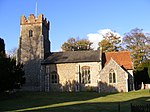Boulge

Boulge is a hamlet and civil parish in the East Suffolk district of Suffolk, England. It is about 3 miles (5 km) north of Woodbridge. The population remained only minimal at the 2011 Census and was included in the civil parish of Debach. The place-name is French and probably means 'bag-shaped piece of land', rather than the 'rough overgrown land' previously assumed.Boulge parish church is the burial place of the local poet and writer Edward Fitzgerald, whose most famous work was his translation of The Rubaiyat of Omar Khayyam. The Church of St Michael and All Angels is Grade II listed as are, separately, the Fitzgerald family mausoleum and Edward Fitzgerald's grave. The Victorian restorations of 1853, 1857, 1867 and 1895 "almost entirely rebuilt" the church. There is a Tournai font of 1150.
Excerpt from the Wikipedia article Boulge (License: CC BY-SA 3.0, Authors, Images).Boulge
Boulge Road, East Suffolk
Geographical coordinates (GPS) Address Nearby Places Show on map
Geographical coordinates (GPS)
| Latitude | Longitude |
|---|---|
| N 52.126 ° | E 1.294 ° |
Address
Boulge Road
IP13 6JS East Suffolk
England, United Kingdom
Open on Google Maps









